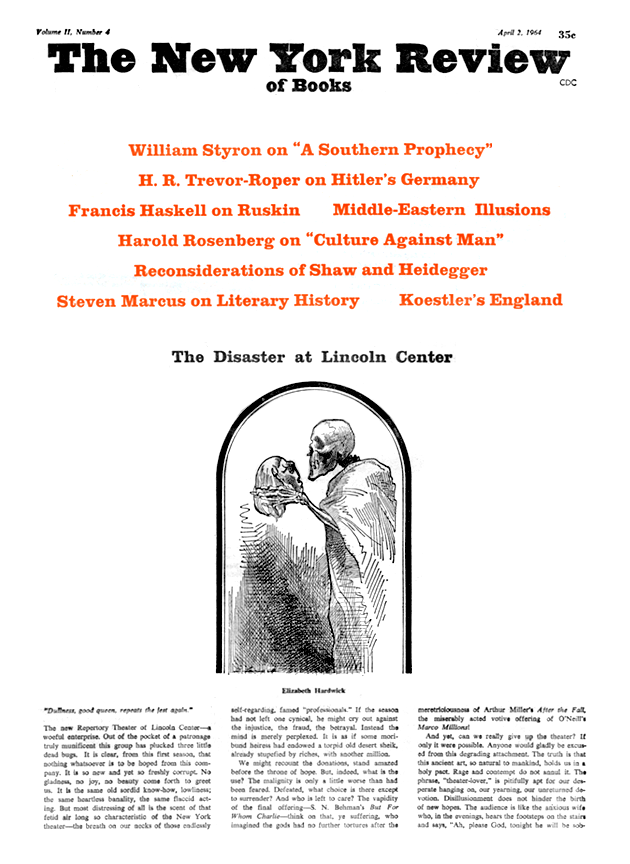In response to:
Strangelove & Fail-Safe from the March 5, 1964 issue
To the Editors:
Reading the exchange between Professor Stern and Professor Brustein can be a bit disturbing. The tone of both letters—especially Professor Brustein’s—is, we think, far from admirable. Examples abound: for instance, Professor Brustein’s beginning (“Although it is rather odd to find professors of philosophy functioning as patriotic watchdogs and apologists for our ‘defense establishment’ “) or his ending (“There are more things in heaven and earth than are dreamt of in your philosophy department”). Are these necessary? or relevant to the argument? We do doubt it and object most to the quick thrusts of wit that seem to exist only for their own sake. Cannot good taste enhance the effectiveness of a piece of criticism?
David Josephson
Michael Pickard
Landey Strongin
Columbia University
New York City
Robert Brustein replies:
About the length of his book, Mr. Hook is an expert. It is twenty-seven pages long, and not eighty-odd, as I mistakenly said. I apologize to him and to his publisher. I was relying on sense memory in making my parenthetical remark about it, and I can only say that it seemed much longer.
The mistake, however, was careless, not careful, as Mr. Hook would suggest, and I meant to conceal nothing. Sidney Hook is a great sniffer-out of conspiracies, but it is precisely this impulse to read dark motives into light activities that makes his remarks on Fail-Safe so weirdly inappropriate. Instead of demonstrating a “rational…approach to problems,” The Fail-Safe Fallacy struck me as a thoroughly absurd book, being compounded of the oddest connections between causes and effects, excessive literalism, ritualistic patriotism, and loony speculation. To illustrate how these make for the very opposite of “truth and common sense,” let me quote some of the book’s more amusing passages:
Exaggerated causality based on an elastic if: “If the influence of Fail-Safe grows and the hysteria it germinates affects public policy and American defense efforts are curtailed, the Communists will become progressively emboldened. They will adopt more and more intransigent attitudes at the disarmament negotiation sessions in the expectation that the growth in hysterical fear about accidental war in Western countries will make their representatives ‘more reasonable’ in granting concessions.”
Swallowing the claims of dubious authorities: “The authors boldly claim that they are not writing fiction or fantasy but are relating a ‘true’ story…It is not only the authors who proclaim that their book tells the ‘truth.’ Their publishers also assure us of this…Influential reviewers have joined the authors and publishers [in this claim]. Clifton Fadiman, whose judgments help determine what hundreds of thousands of Book-of-the-Month members read, said,’ ‘Fail-Safe is the most exciting novel I have read in at least ten years.’ ”
Righteous patriotic rage: “By describing such men [the scientific advisors to the government] as money-hungry monsters, their entire intellectual activity in behalf of a free society is called into question…There is something repugnant to moral sensibility, something that transcends the limits of legitimate political criticism in impugning the patriotism and bona fides of men who have faithfully served the cause of freedom…
Far-out speculation: “The authors have expressed the wish that their book be translated into Russian and brought to the attention of Khrushchev. If he reads it, the authors may be the surprised and unwilling recipients of the Lenin Peace Prize.”
As these passages attest, Mr. Hook’s language has become so full of Cold War clichés that it is no longer functioning as an instrument of thought, while his vaunted logic has been stretched beyond the breaking point. Where the “shoe really pinches” me, then, is not Mr. Hook’s exposure of the claims of Fail-Safe, which nobody but he took seriously to begin with, but rather his humorless, censorial, and moralistic mentality. It is precisely this kind of mind which is, indeed, the mortal enemy of the poetic imagination, and, potentially, of free expression itself.
Let me make these brief points in reply to Frank Meyer:
1) I concede to Sidney Hook his “dogged perserverance,” but Mr. Meyer’s characterization of Fail-Safe sounds to me like paranoid nonsense. It is not a poisonous or deleterious tract, but simply a piece of sensationalist sub-literature which it embarrasses me to have to defend. Does anyone remember by now that the cause of all this coil was a review of Dr. Strangelove?
2) The “spirit Imaginative,” unfortunately, cannot survive without the consent of the body politic,’ so Mr. Meyer will forgive me if I continue to consider these problems together.
3) I wish to testify that I am not now, nor have I ever been, a member of the Council for Correspondence. I find David Riesman’s political views fuzzy, and I am even more bothered by the quality of his prose. But I think his political position ultimately threatens me less than that of Sidney Hook or Frank Meyer.
This Issue
April 2, 1964


